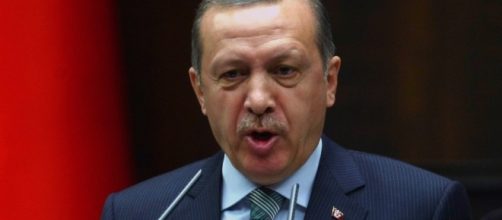Turkish President Erdogan has called on all Muslims to visit “Al Cuds,” the Islamic name for Jerusalem, in order to protest against alleged violations of the rights of Muslims in Israel. After that, according to local reports, he described Israel as racist and discriminatory and the blockade of Gaza as having “no place in humanity.” These statements were made during the opening ceremony of the International Forum on Islamic Trusts in Istanbul on Monday. This sudden outburst on an already difficult relationship came less than one year after the two nations re-established full diplomatic ties following a six-year freeze.
Israeli response
Jerusalem dismisses criticism by "serial human rights violator." An Israeli official said that the ideology of the Turkish president is very similar to that of the Muslim Brotherhood.
Furthermore, an Israeli official also exchanged sharp words with the Turkish Ambassador in Israel during a telephone conversation about the remarks of the Turkish president.
Several Israeli politicians have expressed their strong objections to Turkish President Erdogan’s call for Muslims to massively visit the Aksa Mosque on the Temple Mount to protest against Israel’s “occupation” of Jerusalem.
The press and other media in Israel seem to be taking these remarks very seriously. Many newspapers such as “The Jerusalem Post” have published lengthy articles analysing the escalation in the relations between Israel and Turkey ever since Erdogan came to power about fifteen years ago.
Possible reasons behind the escalation
Recently Erdogan won a referendum which gives almost absolute power to the Turkish President. However, in order for Erdogan to achieve absolute power, he needs to win the next presidential elections in 2019 as the constitutional changes will take effect after the elections. Even though Erdogan won the referendum, his victory was very narrow as he got 51.5% of the votes. He was expecting a victory with at least 60% of the votes.
The referendum results also revealed a split in the country since the more cosmopolitan areas voted against Erdogan’s proposal and the central areas of the country voted for his proposals. Furthermore, the Turkish economy is not at its best.
This simply means that Erdogan may lose the elections in 2019. Erdogan has a history of “exporting” internal problems abroad in order to direct the attention of the people to other things. He has done that often by raising border issues with Greece, Cyprus and Syria in violation of international agreements. He followed a similar policy during the referendum campaign by constantly provoking EU countries in an effort to polarise the voters and finally win. He is probably doing something similar now with Israel in his efforts to gather as much support as possible for the coming elections. Thus, his rhetoric is probably intended for “internal consumption.” However, this is a very risky policy since constantly playing the “Muslims against Jews card” can have serious consequences in the entire middle east.
In addition to that, during the past decade, Erdogan has managed to almost isolate his country from traditional friends and allies. Relations with the US are probably at their lowest point ever because of the United States’ support of Beshmerka Kurds who are the most reliable force fighting against the so-called “Islamic State” that Ankara considers being “terrorists.” Relations with the EU are also bad mainly due to the Syrian refugee crisis since EU countries believe that Turkey is not doing enough to stop the problem. Russian-Turkish relations are also bad after the downing of a Russian fighter jet that was bombing in Syria. This could mean that since Turkey has become almost isolated, Erdogan might be trying to reach out to Muslim countries by playing the dangerous “Muslims against Jews card.” On the other hand, it might just be an expression of his ideology as it is well known that his dream is to make Turkey the leader of the Islamic world.
Whatever his reasons may be, the only sure thing is that he is implementing a very dangerous policy that may have very serious consequences in the entire Middle East.


